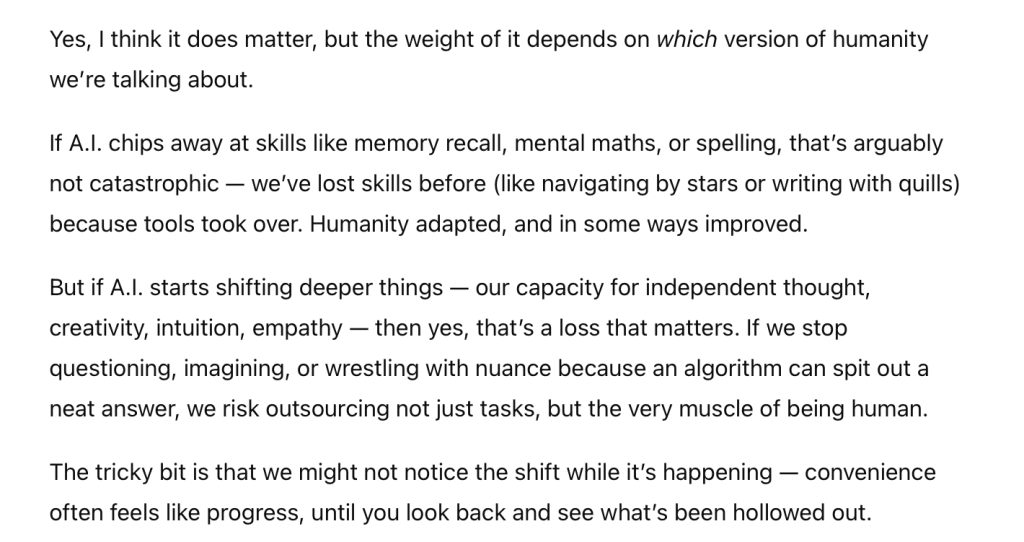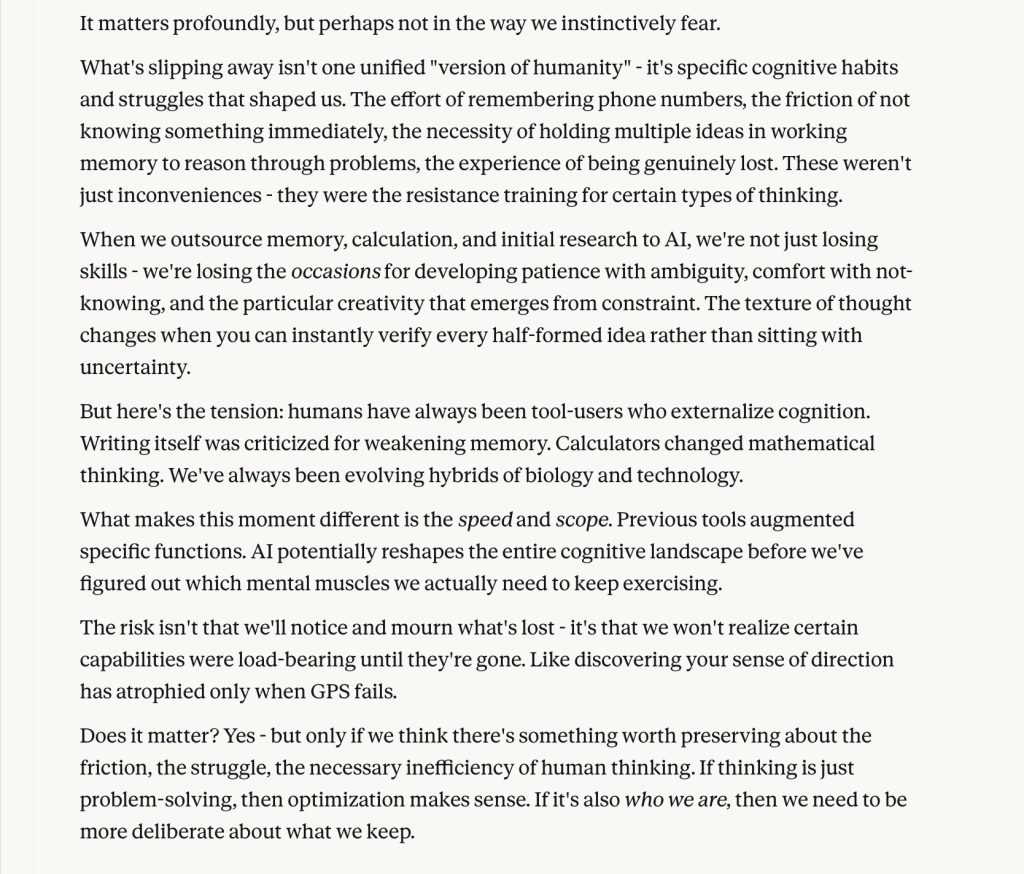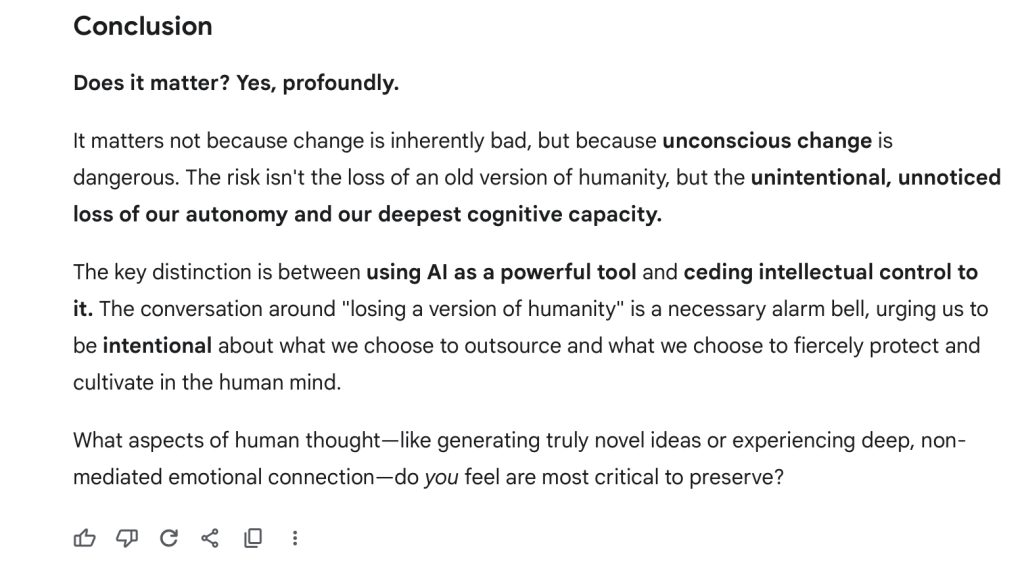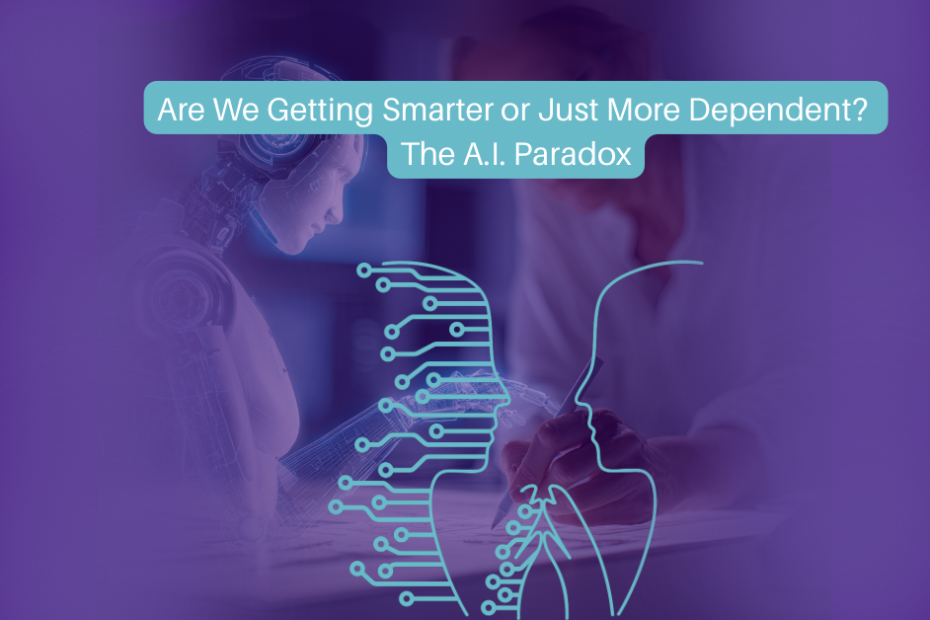What is A.I. doing to us. I’ve seen the rise of the internet.(yes I’m old!) I watched social media transform how we connect and sell. Yet what’s happening now with artificial intelligence, I feel like this is a bit different.
The Default Position
Here’s what I’m seeing everywhere (note this recent post) Someone has a business problem. Any business problem. And the first response almost reflexively is “ask ChatGPT.”
Not “let me think about this.” Not “let me research this.” Just… ask the machine.
It’s become the default position. The first move. The go-to solution.
I keep wondering, is this progress, or are we watching something fundamental shift in how humans operate?
A.I. Rewires Human Brains
Let that sink in for a moment.
I’m not being dramatic. Research published in January 2025 (Gerlich, 2025) found something remarkable. There’s a significant negative correlation between frequent A.I. tool usage and critical thinking abilities. The culprit? Something scientists call “cognitive offloading”—the process of outsourcing mental tasks to external tools.
The study showed that heavy A.I. users scored lower on critical thinking tests, especially those who relied on A.I. for tasks that require reasoning. Younger participants showed higher dependence on A.I. tools and correspondingly lower critical thinking scores.
Think about what that means. We’re not just using a tool. The tool is changing us.
Jose et al. (2025) describe it as a “cognitive paradox”. A.I. can enhance learning, but excessive reliance reduces cognitive engagement and the opportunity for active recall and problem-solving, which are essential components of cognitive development. Students using ChatGPT answered 48% more practice problems correctly, but scored 17% lower on tests measuring conceptual understanding.
They learned the answers. But they didn’t learn how to think.
What Is Being Human?
So let’s pause here and ask, what does it mean to be human?
Does being human mean struggling with problems. The messy process of figuring things out—getting it wrong, trying again, having those “aha” moments at 2am. Does it mean curiosity that leads you down rabbit holes. Comparing options, weighing trade-offs, feeling the satisfaction of making a choice after real thought?
Is it remembering things because you worked to understand them? Is it the creativity that comes from constraints. Is it doubt and confidence and the entire spectrum of mental engagement?
My question is what happens when we eliminate all of that?

The Erosion Has Already Begun
A study examining memory and A.I. (Akgun & Toker, 2024) found that while A.I. enhances personalised learning, prolonged exposure led to memory decline. Students who engaged in pre-testing before using AI showed better retention, but those who relied on A.I. directly saw their memory weaken over time.
We’re already seeing this. Our brains are adapting to a world where we don’t need to remember—because we can always just ask.
Research on creativity (Habib et al., 2024) found that students using A.I. tools showed better fluency and flexibility in generating ideas, but also demonstrated “cognitive fixation” and lower creative confidence. They over-relied on A.I. suggestions rather than trusting their own creative instincts.
So yes, it’s already happening. We’re becoming less human. Or at least, a different kind of human.
Our Customers Are Changing Too
Now let’s talk about what this means for business. If you’re a small business owner, this should make you think very carefully.
A.I. is dramatically changing our customers. And I mean fundamentally changing who they are and how they make decisions.
Here’s what I think is happening. Consumers don’t want to work anymore. They don’t want to think. They don’t want to compare or dig into product details or weigh pros and cons. They just want THE ANSWER, and A.I. will give it to them.
Think about that shift. For decades, marketing has been about persuasion. About building brand affinity. About creating emotional connections. About being there at every touchpoint of the customer journey.
So what happens when A.I. makes purchasing decisions for our customers?
Research from 2025 (Mogaji, 2024) shows that generative A.I. is fundamentally changing consumer behaviour generating virtual representations of products and enhancing the visualisation process, enabling consumers to make more confident purchasing decisions. Consumers are increasingly using A.I. as what researchers call “an unconventional salesperson”—trusting machines to guide their buying decisions.
Will the same marketing strategies work when a machine is doing the shopping?

Marketing to A.I. Machines
Here’s the uncomfortable question every small business owner needs to think about. How do we respond when our customer regards a machine as their most-trusted advisor and friend? (there’s actually an A.I. called friend the way, that can come with a wearable pendant)
Empathy was always the strongest tool in marketing your business. Understanding human needs, fears, desires, that’s been the core of great marketing. But if you’re marketing to a machine, does that matter anymore?
Does brand storytelling work when an algorithm is making the choice? Does emotional connection matter when A.I. is filtering your message through its logic?
I don’t have the answer. I know things are changing faster than most of us are ready to adapt.
The Laziness Question
Here’s something else that bothers me people seem to be getting lazier. Not as an insult—as an observation. Say everything becomes effortless, and A.I. removes all friction… what happens to us?
What will people do with all the extra time A.I. provides?
Here’s the really uncomfortable part, will we need to ask A.I. this question too?
Research on cognitive offloading (Grinschgl & Neubauer, 2022) warns that while A.I. aids efficiency, it may reduce cognitive engagement because people passively accept information without critical scrutiny. When we offload EVERYTHING to a computer, we risk eliminating human skills entirely.
The skills don’t just sit dormant. They atrophy. They disappear.
What This Means for Small Businesses
If you’re a small or solo business owner this should make you think hard about your strategy (yep that’s me always getting you to think about your strategy!).
On one hand, A.I. levels the playing field. You can compete with bigger companies. You have tools that would have required entire departments just a few years ago.
On the other hand, if everyone has the same A.I. tools, how do you differentiate? If every small business is using ChatGPT to write their copy, solve their problems, and develop their strategy, where’s the unique insight? Where’s the competitive advantage that comes from deep human understanding?
And if your customers are outsourcing their decisions to A.I., how do you reach them? How do you build relationships with people who never actually engage with your brand—because their AI assistant does it for them?
Studies show (Ododo et al., 2024) that over-reliance on A.I. can lead people to passively accept information without verification or independent thinking. If your customer’s A.I. is wrong about your product or service, how do you correct that? The customer never even looked.
The A.I. Question We Should Be Asking
Does anyone care about the questions we need to grapple with?
Or is the answer to that question just… ask A.I. to solve it? (lol, yes I’m cracking myself up here!)
That seems to be the loop we’re in. We face profound changes in human cognition, consumer behaviour, and the nature of work itself. Our first instinct is to ask the very technology causing those changes to tell us what to think about them.
There’s something deeply circular about that lol.
A Different Definition of Human?
I think we need to accept that A.I. is changing the definition of what it means to be human.
Maybe we’re heading toward a world where humans are less about processing information and more about… something else. Emotional intelligence? Physical presence? The ability to make intuitive leaps that A.I. can’t replicate?
Researchers (Jose et al., 2025) argue that A.I. should complement, not replace, human instruction—that we need to maintain what they call “germane load,” the cognitive effort necessary for deep learning and higher-order thinking skills. They suggest A.I. works best when it automates lower-order tasks while preserving space for critical thinking, creativity, and independent judgment.
However that requires intentionality. It requires us to consciously decide where A.I. helps and where it harms. I’m not convinced we’re making those decisions. We’re just… adopting it. Everywhere. For everything.
What I’m Not Saying
I’m not saying A.I. is bad. I’m not saying we should stop using it.
I’m saying we need to think about what we’re trading.
Every technology involves trade-offs. We should at least know what we’re giving up.
The Stakes
For marketers and business owners, these changes aren’t coming. They’re here.
Your customers are already using A.I. to make decisions. They’re already offloading the work of comparison shopping, research, and choice. Research shows (2024) that trust in A.I, along with its perceived credibility and versatility, is driving consumers to adopt A.I. as a decision-making partner at unprecedented rates.
The question isn’t whether this will happen. It’s what you’re going to do about it.
And more fundamentally, what kind of human do you want to be in this new world? What kind of thinking do you want to preserve? What skills do you refuse to let atrophy?
Closing Thoughts
The use of A.I.is a big change. Bigger than the changes we saw with the internet and social media. Those changed how we communicate and connect.
AI is changing how we think.
Once you change how humans think, you’ve changed everything.
So here’s what I’m asking you to do (again lol) be intentional. Don’t just accept it. Don’t just adopt it because it’s easier or faster or everyone else is doing it.
Think about what you’re trading. Think about what makes you human. Think about what you want to preserve in yourself and in your customers.
Somewhere in all of this convenience and efficiency and artificial intelligence, there’s a version of humanity that we might lose without even noticing it slipped away.
What Does A.I. Say?
Does this matter? I asked A.I. for fun and the ultimate in irony for this post here’s what it said:
Chat GPT

Claude.

Gemini (summary) link to full answer here

The machine is already changing us.
The question is are we going to do anything about it? Probably not, I guess we will see.
